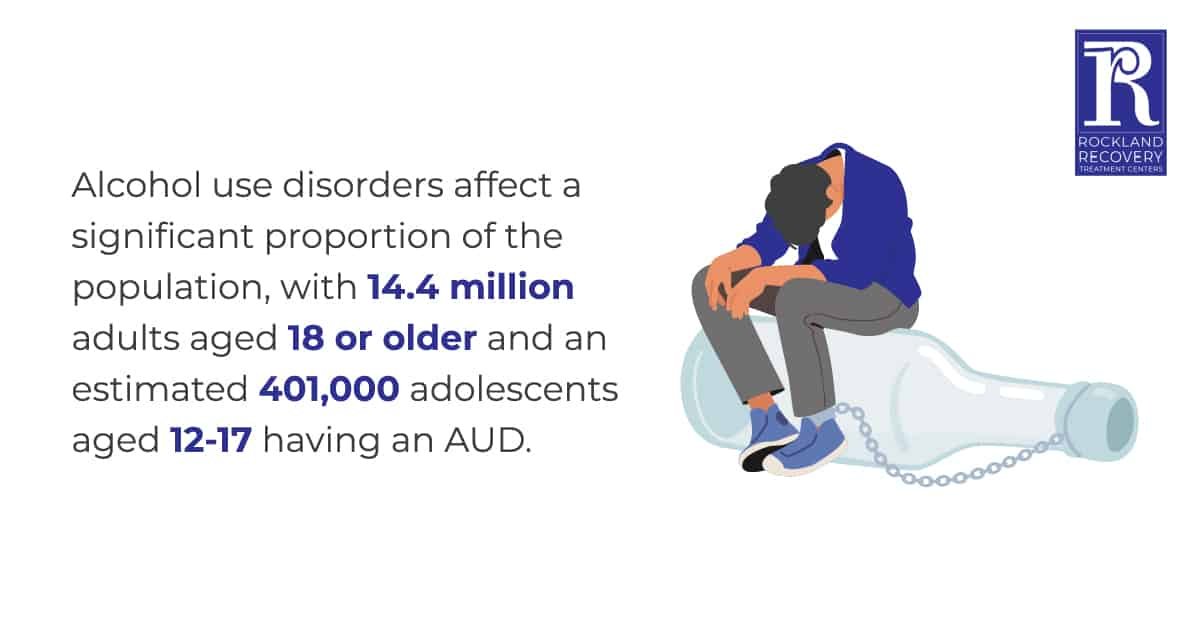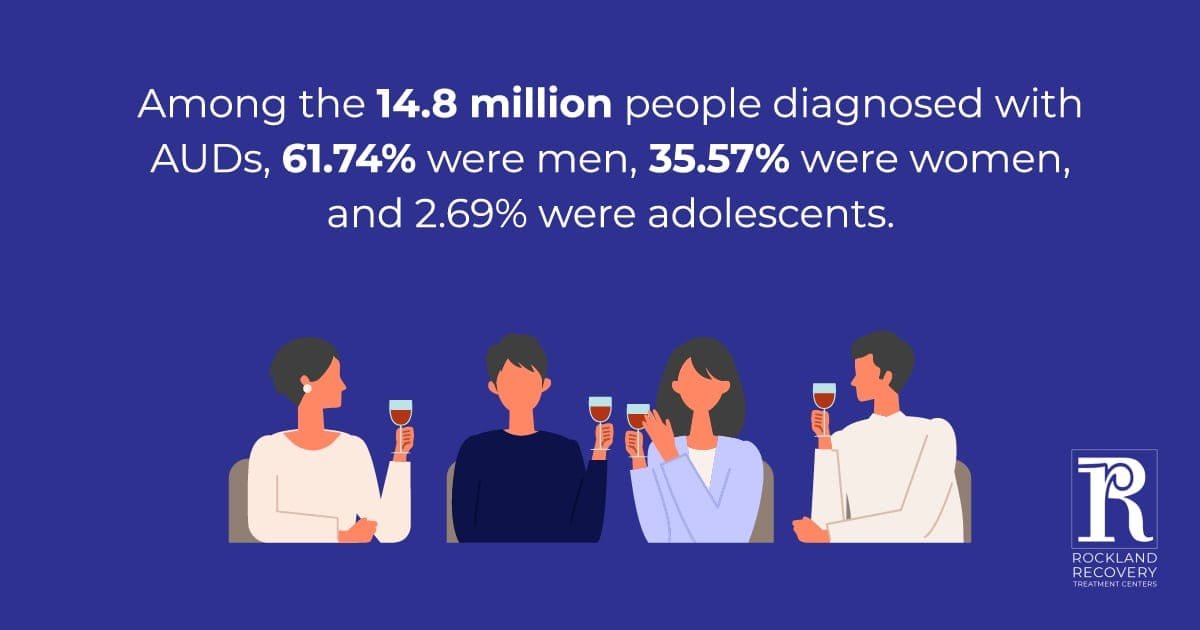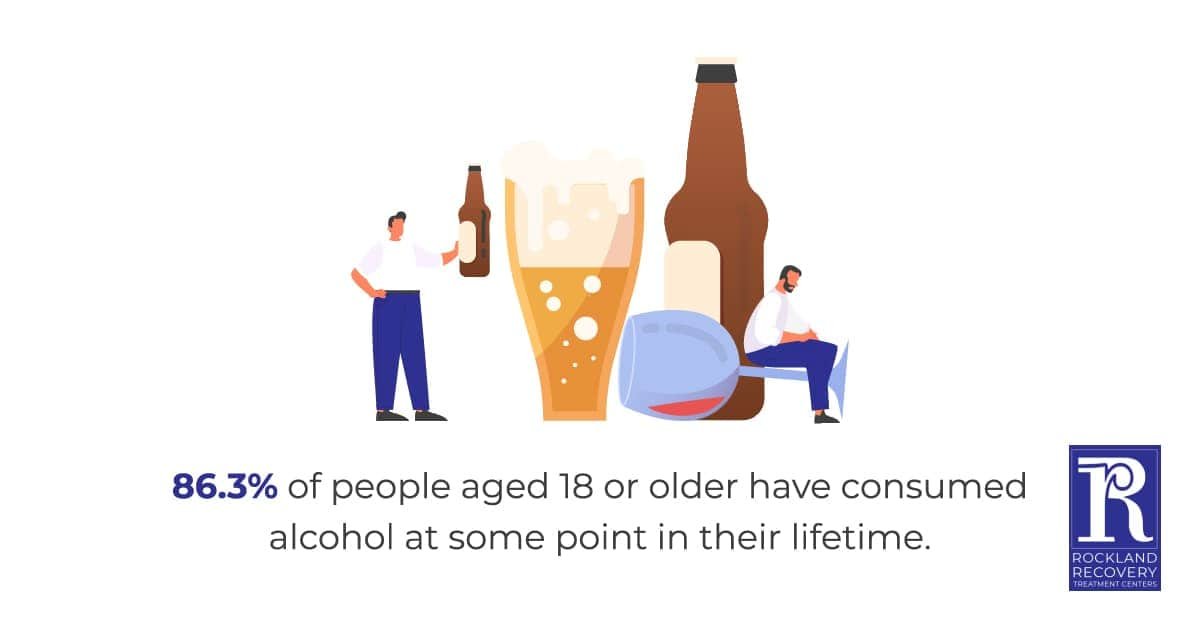Home | Alcohol Addiction
Understanding Alcohol Addiction: Symptoms, Risks, and Treatment Options
Alcohol addiction is a chronic condition that impairs brain function and alters behavior, leading to an uncontrollable need to consume alcohol. This complex condition often begins with social drinking and can progress to a consuming struggle, adversely affecting every aspect of an individual’s life.
Jump to Section
What Is Alcohol?
Alcohol is a chemical compound that has a long history of use as a recreational and medicinal substance. Specifically, the term “alcohol” refers to a class of organic compounds that contain a hydroxyl (-OH) group bonded to a carbon atom. The most commonly consumed alcohol is ethanol (C2H5OH), which is found in alcoholic beverages such as beer, wine, and spirits.
Ethanol is produced by the fermentation of sugars and starches by yeast or bacteria, and it has psychoactive effects on the human brain and nervous system. When consumed in moderation, alcohol can have a relaxing and euphoric effect on the body, but excessive consumption can lead to negative health consequences, including liver damage, addiction, and impaired cognitive function.

What Is Alcohol Addiction?
Alcohol addiction, also known as an alcohol use disorder disorder (AUD), is a chronic and progressive condition in which an individual becomes dependent on alcohol and may have difficulty controlling their alcohol consumption despite negative consequences.
AUD is a result of long-term and excessive alcohol use. It is a disease that can lead to changes in brain chemistry and function. People with alcohol addiction often experience intense cravings for alcohol and can develop tolerance to its effects, requiring larger amounts of alcohol to achieve the desired level of intoxication.
Alcoholism: Causes, Symptoms, Treatment, and Pathology
Symptoms of Alcohol Addiction
The symptoms of alcohol addiction can vary in frequency and severity from person to person but generally involve changes in behavior, mood, and physical health.
Common Symptoms of Alcohol Addiction
Here are some common symptoms of AUD:
- Drinking more alcohol than intended or for a longer period than intended
- Developing a high tolerance for alcohol and consuming larger amounts without feeling nausea or headaches
- Being unable to cut down or stop drinking despite attempts to do so
- Spending a lot of time drinking or recovering from the effects of alcohol
- Withdrawing from friends who do not consume alcohol
- Avoiding situations where there is no use of alcohol
- Neglecting responsibilities at home, work, or school due to alcohol use
- Hiding alcohol use from loved ones, family, or friends
- Continuing to drink despite social, interpersonal, or legal problems caused by alcohol
- Developing withdrawal symptoms when attempting to stop drinking, such as tremors, sweating, nausea, or insomnia
Request a Confidential Call
Take the First Step Toward Recovery.
If you or someone you know is struggling with addiction, we encourage you to request a confidential call. At Rockland Treatment Center, we understand the sensitivity and complexity of your situation and are here to offer you a space to explore treatment options, ask questions, and receive support from experienced professionals. Taking this first step can be challenging, but it’s a courageous and significant move towards a healthier, more fulfilling life.
"*" indicates required fields
Alcohol Addiction, Alcohol Dependence, and Alcohol Tolerance: What’s the Difference?
Alcohol Addiction
Alcohol addiction is a chronic condition that involves a compulsive and uncontrollable desire to drink alcohol, despite the negative consequences that may arise from drinking. It is characterized by physical and psychological dependence on alcohol and a loss of control over drinking behavior.
People with alcohol addiction may experience withdrawal symptoms when they try to stop drinking, and they may continue to drink despite negative consequences, such as problems with relationships, work, or health.
Alcohol Dependence
Alcohol dependence is often used interchangeably with alcohol addiction. It refers to a state in which an individual has become physically or psychologically dependent on alcohol and may experience withdrawal symptoms when they try to stop drinking.
Alcohol dependence can develop over time, as a result of frequent and heavy drinking, but is generally not seen as “serious” as an alcohol substance abuse disorder.

Rockland Recovery Can Help With AUD Treatment
Rockland Recovery is a leading addiction treatment center in Massachusetts. We aim to provide comprehensive and compassionate care to individuals with substance use disorders. Our programs address the unique needs of each individual and incorporate evidence-based therapies to promote lasting recovery.
Our treatment options include inpatient, outpatient, and intensive outpatient programs, along with specialized treatment plans for individuals with co-occurring mental health disorders or a history of trauma.
Alcohol Tolerance
Alcohol tolerance refers to the body’s ability to adapt to the effects of alcohol over time, leading to a need for higher amounts of alcohol to achieve the same level of intoxication. People who drink alcohol frequently or more heavily may develop a tolerance to alcohol.
While alcohol tolerance can be a risk factor for the development of alcohol addiction or dependence, not all individuals who develop tolerance will go on to develop these more serious conditions.
Tolerance to alcohol can vary among individuals and can be affected by factors such as age, gender, body weight, and overall health.
Dangers of AUD
Alcohol substance abuse disorders can have a wide range of negative consequences on an individual’s physical and mental health, as well as their personal and professional life.
Here are some of the dangers associated with alcohol addiction:
- Liver Disease: Long-term heavy drinking can lead to liver damage, including liver cirrhosis and alcoholic hepatitis.
- Cardiovascular Disease: Heavy drinking can increase the risk of high blood pressure, stroke, and heart disease.
- Cancer: Alcohol consumption has been linked to an increased risk of several types of cancer, including breast, liver, and colorectal cancer.
- Mental Health Problems: Alcohol addiction can increase the risk of depression, anxiety, and other mental health issues.
- Impaired Judgment: Alcohol can lead to poor decision-making and risky behaviors.
- Slowed Reflexes: Alcohol can slow down the body’s reflexes, making it dangerous to drive or operate heavy machinery.
- Memory Problems: Drinking heavily can impair memory.
- Mood Swings: Alcohol can lead to unpredictable and potentially dangerous behavior.
- Brain Damage: Long-term heavy drinking can cause brain damage, leading to memory loss, dementia, and other cognitive problems.
- Relationship Problems: Alcohol addiction can cause strain on personal and professional relationships, leading to isolation and social withdrawal.
- Financial Problems: Alcohol addiction can also lead to financial problems over time.
We accept most insurance plans
Impact of Alcohol on Mental and Physical Health
The health risks associated with alcohol addiction can impact both physical and mental health, and the short-term effects of alcohol misuse can also lead to long-term health complications.
By classifying the dangers of alcohol addiction into its mental and physical impacts, we can better understand the complex interplay between addiction and health, and work to address both the physical and mental aspects of this serious problem.
Mental Health Impact
Alcohol can impact mental health in many ways, including:
- Depression and Anxiety: Alcohol abuse can cause changes in brain chemistry that lead to depression and anxiety. These conditions can be worsened by withdrawal symptoms when someone tries to stop drinking.
- Mood Swings: Alcohol use can cause rapid and extreme shifts in mood, making it difficult to regulate emotions.
- Cognitive Impairment: Alcohol abuse can cause impaired thinking, memory, and decision-making skills.
- Psychosis: Chronic heavy drinking can cause hallucinations and delusions, which can be signs of alcohol-induced psychosis.
- Sleep Disorders: Alcohol can interfere with sleep patterns, leading to insomnia, sleep apnea, and other sleep disorders.
- Suicide Risk: Individuals with alcohol addiction are at a higher risk for suicide due to the impact of alcohol on mental health, social isolation, and other factors.
Physical Health Impact
Prolonged heavy drinking can lead to even more physical health problems than those listed above, including:
- Liver Damage: Alcohol addiction can cause inflammation and damage to the liver, leading to liver diseases such as fatty liver disease, alcoholic hepatitis, and cirrhosis.
- Digestive Problems: Alcohol abuse can cause inflammation of the stomach lining and lead to digestive problems like ulcers, acid reflux, and gastritis.
- Pancreatitis: Chronic alcohol abuse can cause pancreas inflammation leading to pancreatitis.
- Immune System Dysfunction: Alcohol abuse can weaken the immune system, making it harder for the body to fight infections and illnesses.
- Neurological Damage: Long-term heavy drinking can lead to neurological damage, including memory problems, coordination issues, and nerve damage.
- Sexual Dysfunction: Alcohol abuse can interfere with sexual function and lead to erectile dysfunction and decreased libido.
Prevalence of Alcohol In the United States
Alcohol addiction is a widespread issue in the United States, affecting individuals from all walks of life. According to the 2018 National Survey on Drug Use and Health, 86.3% of people aged 18 or older have consumed alcohol at some point in their lifetime.
Furthermore, alcohol use disorders affect a significant proportion of the population, with 14.4 million adults aged 18 or older and an estimated 401,000 adolescents aged 12-17 having an AUD.
Who is Most Commonly Impacted By AUD?
According to the National Center for Drug Abuse Statistics, men are more likely than women to have an AUD. Among the 14.8 million people diagnosed with AUDs, 61.74% were men, 35.57% were women, and 2.69% were adolescents.
Alcohol addiction also affects individuals across all age ranges and socioeconomic backgrounds.
Overall, the prevalence of alcohol addiction in the United States is a significant public health concern. It is important for individuals struggling with alcohol addiction to seek professional help to address their addiction and prevent the negative consequences associated with long-term alcohol abuse.
Understanding Alcohol Addiction: How Does it Impact the Brain?
Get fast answers to your questions
The Diagnosis of Alcohol Addiction
Diagnosis of alcohol addiction typically involves a combination of screening, assessment, and diagnostic criteria.
Screening and assessment may be done by a healthcare provider, counselor, or other professional. Individuals will typically be asked about their alcohol use habits, as well as any physical or mental health symptoms that may be related to alcohol use.
The diagnostic criteria for alcohol addiction include issues with controlling alcohol use, continued use despite negative consequences, and withdrawal symptoms when trying to stop using alcohol. The severity of AUD is classified as mild, moderate, or severe based on the criteria met.
Alcohol Addiction and Co-Occurring Disorders
It is important to note that individuals with alcohol addiction may also have co-occurring mental health disorders, such as depression or anxiety. In these cases, a dual diagnosis approach may be necessary to address both addiction and mental health issues. Making sure you get the help and treatment you need is imperative for holistic healing.

Rockland Recovery Can Help With Alcohol Addiction Treatment
Rockland Recovery is a leading addiction treatment center in Massachusetts. We aim to provide comprehensive and compassionate care to individuals with substance use disorders. Our programs address the unique needs of each individual and incorporate evidence-based therapies to promote lasting recovery.
Our treatment options include inpatient, outpatient, and intensive outpatient programs, along with specialized treatment plans for individuals with co-occurring mental health disorders or a history of trauma.
Treatment of Alcohol Addiction
The treatment of alcohol addiction typically involves a combination of detoxification, rehabilitation programs, medication, therapy and counseling, and alternative and complementary therapies.
Detoxification
Detoxification is often the first step in treating alcohol addiction. It involves the removal of alcohol from the body. This process can be uncomfortable and even dangerous, as withdrawal symptoms can be severe. Detoxification should always be done under medical supervision and may also involve the use of medication to help manage withdrawal symptoms.
Rehabilitation Programs
Rehabilitation programs are a critical component of treating alcohol substance abuse disorders. Rehab helps individuals address the underlying causes of their addiction and learn new coping skills.
Rehabilitation programs can be done on an inpatient or outpatient basis and may involve individual and group therapy, family therapy, and education about addiction and recovery.
Medication-Assisted Treatment (MAT)
Medication can help reduce cravings and ease withdrawal symptoms while blocking the pleasurable effects of alcohol. The medicines used are carefully prescribed and monitored by professionals who specialize in addiction medicine.
MAT is tailored to meet unique needs and circumstances and is effective in reducing the risk of relapse and improving overall outcomes.
A Deeper Look at Medication-Assisted Treatment
Therapy and Counseling
Therapy and counseling can also be effective for treating alcohol addiction. Cognitive-behavioral therapy (CBT) is a common approach, as it helps individuals identify and change negative thought patterns and behaviors. Other types of therapy, such as motivational interviewing and contingency management, may also be used.

Rockland Recovery Can Help With Alcohol Addiction Treatment
Rockland Recovery is a leading addiction treatment center in Massachusetts. We aim to provide comprehensive and compassionate care to individuals with substance use disorders. Our programs address the unique needs of each individual and incorporate evidence-based therapies to promote lasting recovery.
Our treatment options include inpatient, outpatient, and intensive outpatient programs, along with specialized treatment plans for individuals with co-occurring mental health disorders or a history of trauma.
Alternative Therapies
Alternative and complementary therapies may also be used to treat alcohol addiction. For example, meditation and mindfulness practices can help individuals learn to manage stress and cravings, while yoga and exercise can promote physical and mental well-being. Acupuncture and massage therapy may also be helpful for some individuals.
Recovery and Relapse Prevention
Recovery from alcohol addiction is a lifelong journey that requires ongoing effort and dedication. After completing a formal treatment program, it is important to have a plan for aftercare and relapse prevention.
Importance of Aftercare
Aftercare is a critical component of recovery, as it helps individuals transition back into their daily lives and continue their progress in sobriety. This may involve ongoing therapy and counseling, support groups, and regular check-ins with a healthcare provider.
Support Groups
Support groups are incredibly helpful for people in recovery. These groups provide a safe and supportive environment for individuals to share their experiences, receive guidance and encouragement, and develop a sense of community with others in recovery.
Relapse Prevention Strategies
Prevention strategies are also essential for maintaining sobriety. These may include identifying risk factors and developing a plan to avoid or manage them, creating a daily routine that promotes self-care and healthy habits, and setting goals and tracking progress to stay motivated.

Rockland Recovery Can Help With Alcohol Addiction Treatment
Rockland Recovery is a leading addiction treatment center in Massachusetts. We aim to provide comprehensive and compassionate care to individuals with substance use disorders. Our programs address the unique needs of each individual and incorporate evidence-based therapies to promote lasting recovery.
Our treatment options include inpatient, outpatient, and intensive outpatient programs, along with specialized treatment plans for individuals with co-occurring mental health disorders or a history of trauma.
Receive the Personalized Care That Best Suits Your Needs
At our recovery center, people will receive personalized care and support from a team of experienced clinicians in a safe and supportive environment. Seeking treatment at Rockland Recovery can provide you or a loved one with the tools and resources you need in order to overcome addiction and achieve long-term recovery.
If you or someone you love is struggling with alcohol addiction, reach out to us today to learn more about our addiction treatment programs. We will be with you every step of the way during recovery.
Contact Rockland Recovery Treatment Centers
GET THE SUPPORT YOU NEED
Rockland Recovery is a leader in addiction treatment and mental health care. Our multidisciplinary team of top medical experts is committed to addressing the unique needs of each patient. Reach out to us anytime – we are available 24/7.
For additional information or to find addiction treatment and mental health services in your area, contact us directly or visit SAMSHA’s treatment locator. For immediate assistance, call or text 988 to reach the National Suicide & Crisis Lifeline or 855.732.4842 to speak to a Care Coordinator at Rockland Recovery.

Medically Reviewed by Kate Perfetti, LADC II
Check if your insurance covers the cost of addiction treatment






Search
Addiction Treatment Programs
Request a confidential call
"*" indicates required fields
Addiction Treatment Programs Massachusetts
Our comprehensive substance abuse treatment services are designed not just to treat the symptoms of addiction but to address the underlying causes, fostering deep, lasting healing and personal growth.